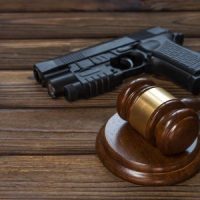I Was Arrested for Gun Possession. What Happens Next?

If you were arrested for illegal gun possession in Virginia, you’re definitely not alone. Virginia has some of the strictest gun control laws in the country. Virginia, like most other states, breaks the Second Amendment down into two components. For the most part, citizens have a broad right to keep (own) firearms. But they only have a limited right to bear (carry) firearms. Furthermore, the law harshly punishes firearms violators.
As outlined below, getting out of jail and preparing a defense are the two most important priorities in a gun possession case. Also as outlined below, a Leesburg criminal defense lawyer plays a vital role in both situations. Doing both things right greatly increases the likelihood of a successful resolution. Furthermore, attorneys assist defendants in post-resolution matters, such as probation revocation, record expungement, and probation early discharge.
Getting Out of Jail
Prompt jail release jumpstarts a criminal defense. Immediate release enables a Leesburg criminal defense lawyer to fully develop possible defenses and fully leverage them during pretrial settlement negotiations. Delayed or denied jail release puts a lawyer behind the eight-ball.
Since gun possession is a nonviolent crime, at least in most cases, three kinds of jail release are generally available in these cases:
- Pretrial Release: Usually, attorneys informally advocate for defendants before pretrial release boards. If this advocacy is successful, if the defendant pays a small fee and promises to abide by certain conditions, the sheriff releases the defendant.
- Cash Bail: Attorneys help defendants gather funds for cash bail. This form of jail release is much like a rental property security deposit. If the defendant abides by all conditions, the defendant gets most cash bail money back when a lawyer resolves the case.
- Bail Bond: The most common form of jail release is a hybrid between pretrial release and cash bail. A lawyer arranges for a defendant to pay about a 10 or 15 percent premium to a bonding company. The resulting bail bond is like an insurance policy. If the defendant violates bail conditions, the bonding company assumes the financial risk.
General conditions of bail include remaining in the county, checking in with a supervision officer, and attending all required court hearings. Offense-specific conditions in gun possession cases often include temporarily surrendering firearms and submitting to substance abuse tests.
Fighting the Case
In Virginia, defenses in gun, drug, or other possession cases usually involve one or more of the “three Ps” of illegal possession.
First, the state must produce the contraband item in court. A valid search warrant is usually part of this production. The warrant must be based on solid evidence, not just the uncorroborated testimony of an informant. A few search warrant exceptions, such as owner consent to search, apply in a few cases.
Next, the state must prove the item was illegal. This gun possession “P” is normally straightforward, except in enhanced possession cases. Prohibited place gun possession matters (having a gun in a school, federal building, or other prohibited place) have additional moving parts. The state must prove each part beyond any reasonable doubt.
Finally, and perhaps most importantly, prosecutors must establish all three elements of criminal possession (close proximity, actual knowledge, and exclusive control). Those last two elements are often almost impossible to prove in vehicle possession cases.
Work With a Diligent Loudoun County Lawyer
There’s a big difference between an arrest and a conviction in criminal law. For a confidential consultation with an experienced criminal defense attorney in Leesburg, contact Simms Showers, LLP, Attorneys at Law. Convenient payment plans are available.
Source:
everytownresearch.org/rankings/state/virginia/
